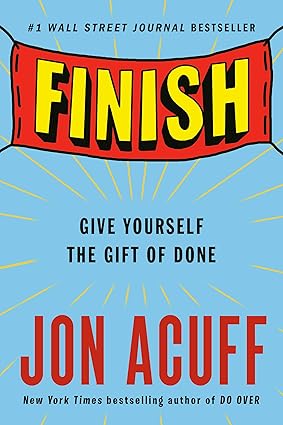Do you have unfinished tasks? Read Finished by Jon Acuff
Book Review of Finished by Jon Acuff
Reading Time – 10 minutes
Introduction
“Finished: Give Yourself the Gift of Done” by Jon Acuff is a fresh and transformative guide that reshapes the way we think about setting and achieving goals. Known for his humorous and relatable writing style, Acuff tackles a serious issue that resonates with many: why so many goals are started but left unfinished. Drawing from personal experiences and extensive research, Acuff argues that the typical methods for achieving goals often set us up for failure. Instead, he presents an unconventional approach to success, emphasizing the importance of progress over perfection and dismantling the myth that relentless hustle is the only path to achievement.
This book is especially relevant for professionals, entrepreneurs, and creatives who find themselves consistently setting ambitious goals but struggling to follow through. It shifts the focus from unrealistic standards to a more practical and sustainable way to achieve consistent, measurable progress. Below, we explore Acuff’s core principles, practical advice, and impactful insights that make Finished a must-read for anyone looking to succeed in their personal and professional lives.
The Perfection Problem
Acuff begins by identifying perfectionism as a major culprit in why people abandon their goals. He points out that perfectionism creates an all-or-nothing mindset, where any imperfection becomes a reason to give up. This is evident in how many New Year’s resolutions falter after just a few weeks. Instead of helping us strive for success, perfectionism often acts as a barrier to progress by convincing us that anything less than flawless execution isn’t worthwhile.
A central message in Finished is that “perfect” is not only unrealistic but also a trap that can paralyze us. Acuff argues that rather than aiming for perfection, we should focus on completing our goals—even if the result isn’t ideal. This mindset shift can lead to better results and less frustration, as the act of finishing itself becomes a powerful motivator for future endeavours.
Cut the Goal in Half
One of Acuff’s most striking recommendations is to “cut your goal in half.” He explains that people often set goals that are overly ambitious, thinking that high standards will drive them to achieve more. However, unrealistic goals tend to lead to burnout and discouragement, making people more likely to give up when progress slows. By cutting goals in half, Acuff encourages a focus on attainable targets, which can lead to greater motivation, productivity, and satisfaction.
In a professional setting, this approach can be transformative. For example, rather than setting a goal to double business revenue in one year, it might be more realistic to aim for a 25% increase. Breaking down large goals into smaller, manageable pieces increases the likelihood of success and gives individuals and teams a greater sense of accomplishment.
Choose What to Bomb
Acuff introduces a novel concept of “choosing what to bomb,” which involves deciding which areas of life to intentionally neglect when working on a specific goal. Since time and energy are limited, achieving goals often requires sacrificing other activities or responsibilities temporarily. By prioritizing what’s essential and consciously “bombing” what isn’t, Acuff argues that we can better channel our focus and avoid burnout.
For professionals, this principle is a game-changer, especially in an age where multitasking and overcommitting are common pitfalls. Instead of feeling the pressure to excel in every area, individuals can zero in on high-priority tasks while accepting that certain areas may not receive the same level of attention.
Make It Fun If You Want It Done
One of Acuff’s most relatable insights is that goals are easier to achieve when they’re enjoyable. He suggests that people underestimate the importance of enjoyment in goal-setting, often thinking that achieving big goals has to be difficult or unpleasant. Acuff encourages readers to find ways to make the process fun because, as he puts it, “fun is fuel.” Making goals enjoyable increases commitment and reduces the likelihood of giving up.
Professionals can apply this principle by incorporating elements of fun into their work processes. Whether through team-building activities, friendly competitions, or simply allowing for creativity and flexibility in projects, making work enjoyable can increase productivity and morale.
Get Rid of the Secret Rules
Acuff also addresses the “secret rules” people unknowingly follow, which often hold them back. These rules can include unspoken beliefs like “I have to work 24/7 to be successful” or “If I don’t achieve this by a certain age, I’m a failure.” Such mental restrictions limit our potential and often cause unnecessary stress. Acuff encourages readers to identify and challenge these invisible rules, which can free them from self-imposed limitations and open up new possibilities.
In a business context, shedding these secret rules can lead to breakthroughs in performance and confidence. For instance, letting go of the notion that “success means doing it all alone” can empower professionals to seek collaboration and support, often resulting in higher-quality outcomes.
Give Yourself Grace
One of the most refreshing takeaways from Finished is Acuff’s emphasis on self-compassion. He reminds readers that setbacks are a natural part of any process and encourages them not to be too hard on themselves when things don’t go perfectly. This principle is especially impactful in a professional world where failure is often stigmatized. Instead of viewing setbacks as signs of inadequacy, Acuff suggests treating them as learning opportunities that can provide valuable insights for future attempts.
The idea of giving oneself grace can be transformative for both personal and professional development. By shifting the focus from rigid expectations to a mindset that allows room for growth and resilience, individuals can approach their goals with renewed enthusiasm and a willingness to try again.
Conclusion
Jon Acuff’s Finished is a practical and thought-provoking guide that challenges traditional approaches to goal-setting. By advocating for progress over perfection, encouraging fun and flexibility, and teaching readers to prioritize wisely, Acuff offers a refreshing approach to completing goals. This book is a reminder that the path to achievement doesn’t have to be gruelling or defined by impossible standards. Instead, by being realistic, adaptable, and kind to ourselves, we can not only finish what we start but also enjoy the journey along the way.
Whether you’re a professional looking to enhance productivity, an entrepreneur chasing ambitious dreams, or simply someone wanting to follow through on personal aspirations, Finished provides tools and insights to help you succeed. In a world where unfinished projects often pile up, Acuff’s strategies offer a roadmap to completion—and to the joy and satisfaction that come with seeing a goal through to the end.
In the comments let me know what strategies help you to finish your goals.
 Julie Stobbe is a Trained Professional Organizer and Lifestyle Organizing Coach who brings happiness to homes and organization to offices, coaching you virtually using Zoom. She has been working with clients since 2006 to provide customized organizing solutions to suit their individual needs and situations. She uses her love of teaching to reduce clutter, in your home, office, mind and time. She guides and supports you to be accountable for your time, to complete projects and to reach your goals. If you’re in a difficult transition Julie can coach you to break-free of emotional clutter constraining you from living life on your terms. Online courses are available to help instruct, coach and support your organizing projects. Get started by downloading Tips for Reorganizing 9 Rooms.
Julie Stobbe is a Trained Professional Organizer and Lifestyle Organizing Coach who brings happiness to homes and organization to offices, coaching you virtually using Zoom. She has been working with clients since 2006 to provide customized organizing solutions to suit their individual needs and situations. She uses her love of teaching to reduce clutter, in your home, office, mind and time. She guides and supports you to be accountable for your time, to complete projects and to reach your goals. If you’re in a difficult transition Julie can coach you to break-free of emotional clutter constraining you from living life on your terms. Online courses are available to help instruct, coach and support your organizing projects. Get started by downloading Tips for Reorganizing 9 Rooms.
Contact her at julie@mindoverclutter.ca


